Episodes
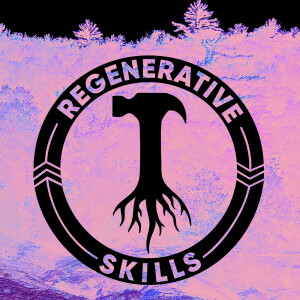
Friday Mar 10, 2023
Friday Mar 10, 2023
If you’ve been following the episodes so far this season, you know I’ve got a lot of projects and travels going on right now. Since the episode I recorded in Nicaragua, I’ve also been on a project on the island of Madeira and just two days ago I got back from a 9 day trip to Portugal. Though I haven’t been able to record everything like a diary the way I would have liked to, today I did get a chance to sit down with Nick Steiner who was with me every step of the way during the tour around three of our favorite farms around the Alentejo region.To keep things short, we start by talking about the activities we were involved with and the farm visits with the Climate Farmers team. Then we go into more detail about the enterprises as well as the management techniques and experiments that each of them are implementing and having stunning results with, and then, since it wouldn’t be an episode with me and Nick if we didn’t geek out about water management, we talk about the opportunities we observed from the different farms on how to hold and store water better, and what implications this could have for the fertility and production on each of their landscapes.
I know that this will be only one of many visits we make to Portugal, especially given the requests and interest we’ve been getting from other farmers in the region to help with water scarcity issues. In future episodes, Nick and I will start to move from the larger overview talks like today, and go into more detail on the causes and effects of broken water cycles, the range of techniques available for specific contexts, and actual tutorials and classes where you can transform your land into a water retention landscape.
Join the discord discussion channel to answer the weekly questions and learn new skills with the whole community
Links:
https://www.permanick.com/welcome
https://instagram.com/herdadesluis_porcusnatura?igshid=YmMyMTA2M2Y=https://instagram.com/permanick_permaculture?igshid=YmMyMTA2M2Y=https://instagram.com/montesilveirabio?igshid=YmMyMTA2M2Y=https://instagram.com/sergio.grapegrower?igshid=YmMyMTA2M2Y=
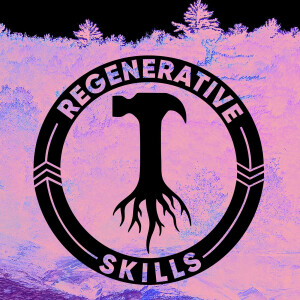
Friday Mar 03, 2023
Friday Mar 03, 2023
I’ve got a treat for you all today. After almost 3 years, I’ve got Shane Simonsen back on the show. For those of you who are not familiar with Shane, I’ll give a quick intro and then point you to the links to the two previous shows I recorded with him because they’re really worth while.
Shane is a biologist who has a fascinating project on 40 acres in Queensland, AU centered around the concept of zero input farming, which also happens to be the name of the popular blog he’s written about it, which is one of the most original approaches to large scale food production that I’ve come across in a long time and asks the simple question of “how might we still be able to produce enough food for ourselves and our communities if we no longer had access to all of the inputs and fossil fuels of our modern times.”
Despite sounding like a post apocalyptic exercise in primitive living, Shane’s writing is surprisingly optimistic and pragmatic. In a small excerpt from his very first post from September 2019 he writes: In the resource constrained future ahead of us these input dependent approaches to growing food will become impractical or impossible. Instead new systems that rely on locally adapted crops and livestock, integrated into systems that are truly compatible with the local geology and climate will be required. I have taken on the challenge of developing these systems in our particular region in the remaining two decades of vigor I have left in me. This blog is an account of this journey. Hopefully I can inspire some of you to follow in my direction and develop your own locally adapted systems.
, but that’s just an excerpt from the original interview I did with Shane from before the Pandemic. Today I’m speaking with him about how his zero input strategy helped during the Australian response to the pandemic. We go over what he learned and observed from the resilience and weak points of his farm, as well as how it has caused adaptations for the next steps ahead.
On top of all the farm and ecology talk, we dig into the new series of a unique brand of science fiction novels that he’s just about to publish. Though it’s much better to hear him explain it, I can say that I’ve never yet found literature on a possible future for a reintegrated future human society whose world is built around biological technology in contrast to the industrial and mechanical technology that dominates our modern world as well as every other sci fi premise I’ve so far come in contact with. That alone has my imagination and curiosity piqued and I hope it's something we can explore a lot more in future sessions.
Join the discord discussion channel to answer the weekly questions and learn new skills with the whole community
Links:
https://haldanebdoyle.com/
https://zeroinputagriculture.substack.com/
https://www.youtube.com/channel/UCf4r7XRgHoe4Ac0v2YVeQkg
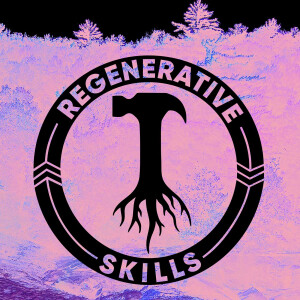
Friday Feb 24, 2023
Friday Feb 24, 2023
One of the most important resources we’ve been working to create for our network of farmers here in Europe through my work at Climate Farmers is what we’ve called our coach matching service. We’ve long since seen that one of the hurdles that farmers face in their transition to regenerative agriculture is either one of two things. Either not the right specific information and support based on their unique context, or as is more common in the internet age, too much information to the point of overwhelm, inaction, and self doubt.The truth is that having too much information fighting for space in your farm management plan is often more damaging than not knowing what to do.For this reason we’ve put a significant effort into finding the most reputable and experienced coaches and consultants in regen ag around Europe in order to help match farmers who are looking for assistance with the right professional for them.
I also put emphasis on the title of coach there because we recognize that these transition journeys are part of a long term strategy for the health of farm ecosystems, businesses, and the health of the people involved.
No matter where you are in your own journey it can be helpful to receive some dedicated support and assistance from someone with an outside perspective and experience in your challenges to get you over the hurdles in your way to break through to the next level.
At the same time, this represents a paradigm shift in the conventional attitude. Many farmers are used to receiving advice from consultants and “experts'' who give calculations and recommendations which are to be followed precisely. Coaching relationships on the other hand assume that farmers and land managers know their land and businesses better than anyone and only need some guidance, new ideas, and structure to reach their own potential and that of their farm ecologies.
For that reason I reached out to one of the most prominent voices in this space, Nicole Masters, who is also a trainer of farm coaches to help me better understand the value of coaching relationships and journeys.Though Nicole has been on this show a few times now, we’ve mostly explored the more technical details of water management and soil science, but in this episode we’ll look at her perspective on the work she does with growers directly as well as the programs she’s created for the professionals who are guiding farmers on their transition journeys.
Nicole talks about the paradigm shift in coaching that needs to accompany a paradigm shift in land management as well as how it can be approached from both sides. From the coaching side we talk about the abilities and characteristics that make for an effective coach. From the farmers' side we discuss how they can prepare themselves for a successful coaching relationship as well as how to assess a potential coach to see if they’d be a good fit for them.
Join the discord discussion channel to answer the weekly questions and learn new skills with the whole community
Links:
https://integritysoils.com/
https://integritysoils.com/pages/create-coaching
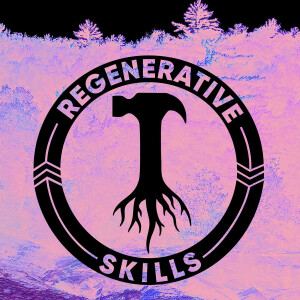
Friday Feb 17, 2023
Friday Feb 17, 2023
The mindset required to find and purchase the land and home that my partner and I are now living in is not the same mindset required to develop and invest in the long term journey of being here. This has become obvious to me as new opportunities and collaborations come up in my work life and I find myself falling into the old habits and tendencies that I've become used to in the previous years.
I'm now in a position in which I need to take some steps back, look at the whole that we are managing and develop a long term strategy for the more deeply connected life and career that my partner and I have talked about cultivating all along.
The constant hustle, savings, and work that helped us get established on our property is a mindset of scarcity and constant want. If we want to become integrated members of our human and natural communities and become "people of place," I will need to invest in the relationships, co-dependence, and stewardship that very few people or institutions are capable or teaching.
In today's episode I start by giving an update of the first few months of being moved into our new home and farm. The priority projects that we've taken on to get comfortable and established here as well as all the considerations and conflicting opportunities that have guided and disturbed our decisions in this short time.
Since the deeper questions of how to orient ourselves for a longer term path towards our unique definition of a quality life is one that I often hear others struggle with, I wanted to share some insights from my own process as well as the tools and resources I turn to in order to make the process more manageable. I hope this discussion sparks a longer conversation about the deeper motivations and core values beneath the projects and work that we do on the land and in our communities.
Join the discord discussion channel to answer the weekly questions and learn new skills with the whole community
Links:
https://www.youtube.com/watch?v=9YsCRc99iQA&t=21s
https://www.youtube.com/watch?v=8rvFZJBC_Ug&t=124s
https://www.youtube.com/watch?v=vniWaDUiW8g
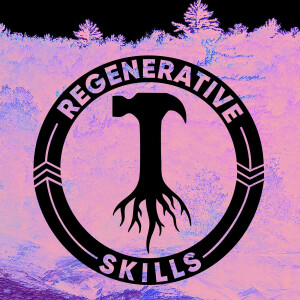
Saturday Feb 11, 2023
Saturday Feb 11, 2023
Those of you who’ve been following this show for a while have watched my fascination with water and its role in every ecosystem grow over the years. By now, between my professional experience, the courses I’ve taken, and the research I’ve done, I feel quite competent in working with land in a practical way to restore its cycles and functionality on the land. Where my understanding is still lacking is in the cutting edge science of the way that plants use and interact with water. I’m no research scientist and don’t hold any degrees in biology or ecology, but I’m fascinated to go deeper into the micro workings of water at cellular levels to understand how we can better manage the plants and other living beings in order to oc´create the highest potential of ecosystem function on the land we interact with.
With that very small and achievable goal in mind, I reached out to my friend and one of my favorite guests on this show to help me to understand the deeper biological and physical workings water within plants.Harriet is an independent research scientist from Austria known for her work uncovering the unexplained phenomena of plant growth and development. Informed by her background in microbiology, mycology, and biochemistry, Harriet has a unique capacity to describe little-known connections between emerging biological research and agriculture. Her objective is to use the scientific background that we have to introduce agricultural methods that are more resilient and also low input for farmers benefit.
In this conversation we explore the observations in Harriet’s garden that prompted her to begin looking deeper into why some plants wilt and struggle in hot and dry conditions, while others are able to continue growing and even thrive. She introduces me to some of the lesser known capabilities of plants to cycle water internally and overcome drought conditions.
We also talk about the indications that anyone can observe in plants that demonstrate their health and resilience to drought conditions as well as some of the practical management changes in the soil that can promote better water handling in crops.
A lot of innovation has also been happening lately in the field of foliar feeding due to the potential of reverse transpiration through leaves and stems, but Harriet also has some important criteria for growers to consider to ensure that their foliar applications are effective and not causing unintended damage.
Join the discord discussion channel to answer the weekly questions and learn new skills with the whole community
Links:
https://regenerativeskills.com/harriet-mella-demystifies-cutting-edge-soil-science-for-ideal-plant-health/
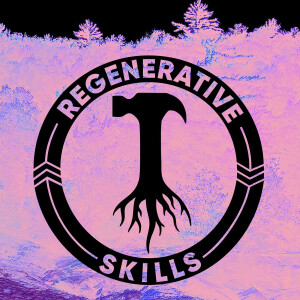
Friday Feb 03, 2023
Friday Feb 03, 2023
Welcome to the first epsiode of season 7! So much has happened in the month between the last episode where I introduced my partner Alba and our new home and farm in Spain. There have been a lot of projects both inside the house, out on the land, and within our own businesses. One of the new developments that came up is that I was invited to assist on a watershed restoration design and install project with a company that I've admired and looked up to my whole career, Restoration Agriculture Development (RAD). RAD is the design and project installation company founded by Mark Shepard, the legendary farmer and author who has helped to define the ambitions through his work and writings such as "Restoration Agriculture" and "Water for Any Farm." Though Mark wasnt involved with this job directly, I got to work with their team lead, and accomplished farmer in his own right, Jake Takiff from Cedar Springs farm in Hotchkiss, Colorado.
In this first episode, I'll be trying out a new format in which I'll bring you along for the duration of this project and give detailed updates about how work is moving forward, what we're learning in the process, and the main takeaways. If you enjoy this format, please let me know, since I have a lot of potential jobs lined up, farm visits, workshops and my own projects at home I would love to share with you. As always, the best way to get in touch and have your voice heard is to connect via the Regenerative Skills Discord server. You can sign up for free below.
Join the discord discussion channel to answer the weekly questions and learn new skills with the whole community
Links:
http://www.restorationag.com/
https://ranchonanacatl.com/
https://www.instagram.com/ranchonanacatl/
https://rainwaterrunoff.com/cedar-springs-farm-in-hotchkiss-colorado-practising-regenerative-agriculture-at-high-altitude/
https://www.instagram.com/cedarspringsfarm/
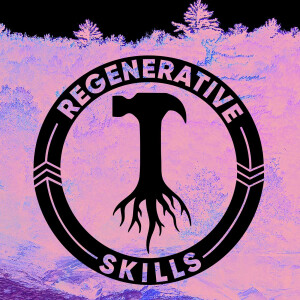
Friday Dec 30, 2022
Friday Dec 30, 2022
2022 has been an intense year for me behind the scenes. I don't often talk about my personal life here on the show, but I've had some major milestones this year that I'm excited to share with you.
It's been a long journey of almost 4 years since leaving the project that I cofounded with my two colleagues in Guatemala around the time that I started this podcast, until now when my partner and I are recently moved into our new little farm in the mountains of Catalunya in Spain.
In this episode, for the first time, I'm going to be speaking with my partner Alba about what that journey has been like and what we have planned for our home, farm, and the businesses that will support its development.
https://www.youtube.com/watch?v=9YsCRc99iQA&t=15s
https://www.youtube.com/watch?v=8rvFZJBC_Ug&t=6s
https://www.youtube.com/watch?v=vniWaDUiW8g
Join the discord discussion channel to answer the weekly questions and learn new skills with the whole community
Links:
https://www.instagram.com/regenerative_skills/
https://www.instagram.com/molidebojons/
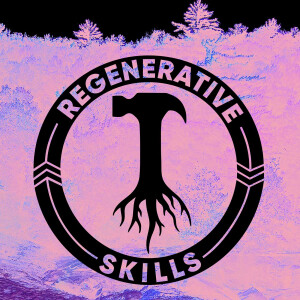
Friday Dec 23, 2022
Friday Dec 23, 2022
I’ll keep today’s intro real short because this is a long episode. The short of it is that my good friend Nick Steiner and I have been diving real deep into the topic of landscape hydrology and water cycle restoration both on our own properties and through our work with clients and farmers all around Europe.
In the process we’ve become complete nerds about this topic and all of the incredible potential that working with water systems can have for the ecology and quality of life where it’s applied appropriately.
So today, Nick and I are just gonna lay it all out and summarize some of the many learnings we’ve gathered through courses, research, personal experience and case studies from our work.
We’ll be looking at hydrological work through small home scale actions to massive regional and country level policy change and transformation.
So instead of explaining all of this twice, let’s just jump right in.
Join the discord discussion channel to answer the weekly questions and learn new skills with the whole community
Links:
Contact us to schedule a free water project planning session
https://www.linkedin.com/in/oliver-goshey-17a518122/
https://www.linkedin.com/in/steiner-nick/
https://www.instagram.com/permanick_permaculture/
https://www.instagram.com/regenerative_skills/
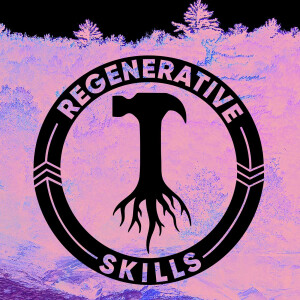
Friday Dec 16, 2022
Friday Dec 16, 2022
It’s not often I get to do interviews in person, and it’s not often that I get a chance to go to Italy to visit amazing farms and take a course on regional scale landscape hydrological restoration either. In fact this was my first visit to Italy at all. All of these fortunate circumstances came together at the end of November, a couple weeks ago, thanks to the incredible efforts and coordination by my friend Ed Cutler, the director of the Tuscany Environment Foundation.
Early on Ed invited me to come and assist on a four day course that he was planning with Zach Weiss from Elemental Ecosystems and Lorenzo Costa from La Scoscesa farm, and since I’ve been in Zach’s Water Stories course since the beginning I couldn’t pass up the opportunity to go out and get my hands dirty with a few of my heroes while working on one of my biggest topics of passion.So today’s interview is taking place up on Lorenzo’s farm a day after the course wrapped up with incredible views of the mountain valleys and vineyards around as the three of us discuss some of the most important learnings of the week.
In that session we covered a lot of ground. Much like in the course itself we zoom in and out throughout the discussion to explore the challenges and opportunities for water restoration work at a large scale and in smaller and more specific examples. Lorenzo gave us great information and context on the history of land use in the Tuscan area as well as his own farm. Zach explained a lot of bigger picture concepts about working with water and the solutions for degraded landscapes and mismanaged infrastructure.
We also refer regularly to the farm that hosted the course of the previous days, Tenuta di Paganico, which I highly recommend that you check out. I’ll put the link to their website and social media in the show notes. Despite the challenges that they have with soil erosion and old water retention features that are no longer functioning, they are doing amazing work with forest management and grazing animals in silvopasture systems among others. I also highly recommend stopping by their farm store and restaurant if you ever find yourself near the town of Paganico.
I know this isn’t a super detailed introduction to the interview, but everything is very well spelled out from personal introductions through the progress of the learnings from the course so I’m not worried that you’ll fall behind.
Join the discord discussion channel to answer the weekly questions and learn new skills with the whole community
Links:
https://www.instagram.com/lorenzo.costa1/
https://www.instagram.com/lascoscesa/
https://www.elementalecosystems.com/
https://www.waterstories.com/
https://www.youtube.com/@Water_Stories
https://www.tenutadipaganico.it/en/
https://www.instagram.com/tenuta_di_paganico/
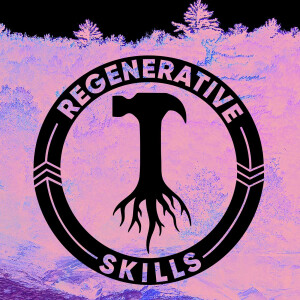
Friday Dec 09, 2022
Friday Dec 09, 2022
Today’s session, in contrast to the more challenging subject of the last two weeks, will take me back into my comfort zone, namely, nerding out about plants and how bizarre and amazing they are.
I don’t claim to be a plant expert, far from it. I’m more like a fanboy of a stadium band that has been around forever pumping out the hits and that I only found out about recently and act like I discovered them. I hope those of you who’ve been growing and studying plants your whole lives will forgive me.
A perfect example of a person who’s been a lifelong aficionado of the plant kingdom is Scott Zona. Scott holds a B.S. in horticulture and an M.S. in botany from the University of Florida. His Ph.D. in botany is from Rancho Santa Ana Botanic Garden (now the California Botanic Garden) and Claremont Graduate University, California.
He has explored plants in Florida, California, Mexico, Central America, the Caribbean, the Pacific islands, Indonesia, Malaysia, New Guinea, and Madagascar. His interests are in the diversity and natural history of tropical plants, especially palms, salvias, and bryophytes, and has published over 175 articles on these topics in various magazines, book chapters, and scholarly journals.
He is the co-author of two books, Encyclopedia of Cultivated Palms (2nd ed.) and The Palm Collection at the Jardín Botánico de Culiacán.
His third book, A Gardener’s Guide to Botany, will be out in December 2022. Scott is also a member of American Bryological and Lichenological Society, Cactus & Succulent Society of America, International Association of Bryologists, International Palm Society, North American Rock Garden Society, and the Royal Horticultural Society and he is a Research Collaborator with the Herbarium of the University of North Carolina at Chapel Hill.
All of this has made him way over qualified to write his new book, A Gardener’s Guide to Botany: The biology behind the plants you love, how they grow, and what they need.
In this interview, Scott and I really just spend the whole time talking about why plants are the coolest and why everyone should love them too. This brings us through a world of plant physiology and biological processes, nutrition hydration and soil health principles, and the incredible adaptability and senses that have evolved in the vegetative world to overcome all manner of stresses and challenges in different environments.
Despite the fact that Scott reminds me a few times that his book is not about how to grow plants or garden, I can’t help but prod him for advice and insights about exactly these topics since that’s my own most vivid connection with plants. All the same there’s something for every plant lover in this episode.
Join the discord discussion channel to answer the weekly questions and learn new skills with the whole community
Links:
https://bookshop.org/p/books/a-gardener-s-guide-to-botany-the-biology-behind-the-plants-you-love-how-they-grow-and-what-they-need-scott-zona/18396717?ean=9780760374450









